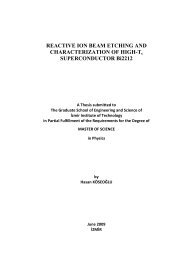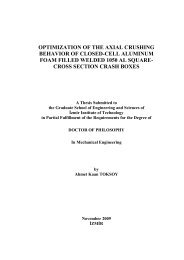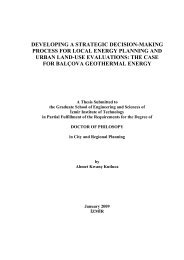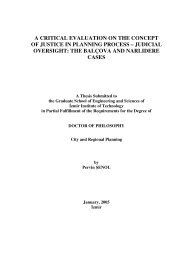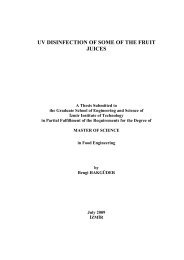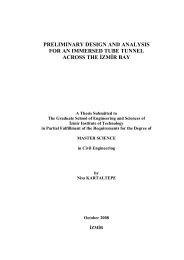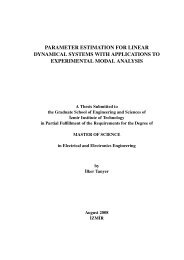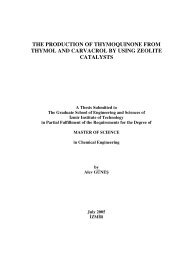energy performance analysis of adnan menderes international airport
energy performance analysis of adnan menderes international airport
energy performance analysis of adnan menderes international airport
Create successful ePaper yourself
Turn your PDF publications into a flip-book with our unique Google optimized e-Paper software.
CHAPTER 1<br />
INTRODUCTION<br />
The world <strong>energy</strong> demand increases rapidly with economic and population<br />
growth. The world population has doubled from 1970 to 2007, while <strong>energy</strong><br />
consumption was increased more than four times per person in the same period (Soyhan<br />
2009). According to International Energy Agency study, the world <strong>energy</strong> demand in<br />
2020 would be 50%-80% higher than the 1990 levels (OECD, Paris, 1995).<br />
Increasing <strong>of</strong> <strong>energy</strong> consumption has detrimental effects on environment such<br />
as global warming, ozone destroying gases, gaseous pollutants, and microbiological<br />
hazards. The most important problem is global warming resulted from conventional<br />
effluent gas pollutants such as SO2, NOx, CO2, and CO.<br />
The <strong>energy</strong> requirement <strong>of</strong> any country is a crucial input for the economic and<br />
social development. Hence <strong>energy</strong> consumption is determined depending on population<br />
growth and rapid urbinization. Turkey has involved in the group which consists <strong>of</strong> the<br />
fastest growing <strong>energy</strong> markets in the world for nearly two decades because <strong>of</strong> its young<br />
and growing population, per capita <strong>energy</strong> consumption, rapid urbanization, and<br />
economic growth. An average annual growth rate <strong>of</strong> Turkish economy has been reached<br />
to 4.1% over past 20 years. The process <strong>of</strong> economic development in the devoloping<br />
countries, in the case <strong>of</strong> Turkey, is the cause <strong>of</strong> rapid growth for <strong>energy</strong> consumption<br />
and imports. In Turkey, <strong>energy</strong> imports have increased rapidly because <strong>of</strong> small increase<br />
in national <strong>energy</strong> production and rapid increase in demand. In the next years, this<br />
increase in <strong>energy</strong> imports will be continued. Net <strong>energy</strong> import, which met 54% in<br />
1990 and 67% in 2000 <strong>of</strong> the total primary <strong>energy</strong> supply, is expected to increase to<br />
76% in 2020. Turkey as a developing country is getting more dependent on imported<br />
<strong>energy</strong> resources and is getting almost two thirds <strong>of</strong> its <strong>energy</strong> needs from imported<br />
<strong>energy</strong> resources. Consequently, providing sufficient and secure <strong>energy</strong> supplies<br />
become the top priority <strong>of</strong> Turkey’s <strong>energy</strong> policy (Ozturk 2005).<br />
Domestic and industrial buildings are responsible for approximately 40 percent<br />
<strong>of</strong> the world annual <strong>energy</strong> consumption. In 2004, building consumption in the<br />
European (EU) was 37% <strong>of</strong> final <strong>energy</strong>, bigger than industry (28%) and transport<br />
1



